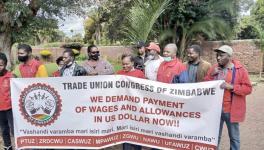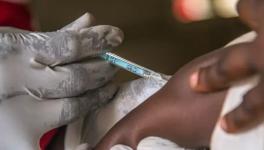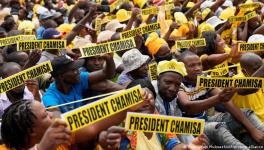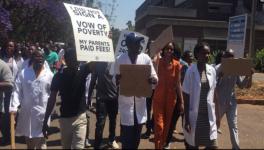Zimbabwe’s Doctors Defy Government Diktat, Continue Strike
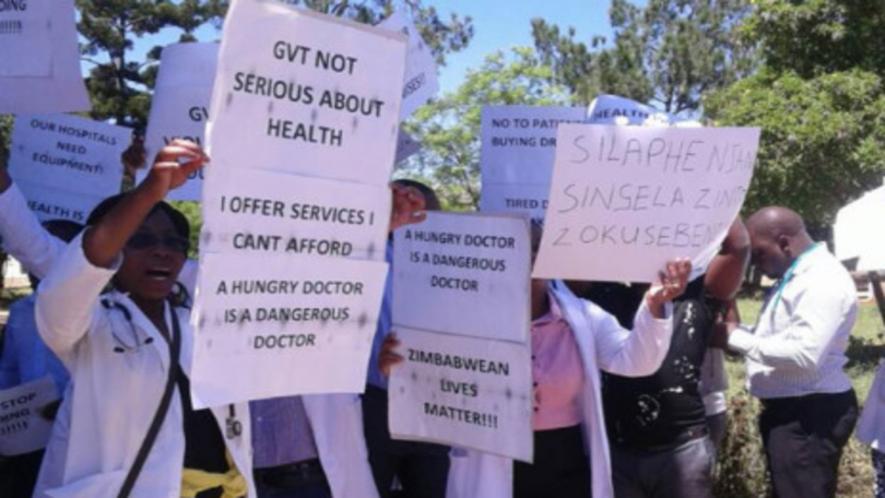
Doctors in Zimbabwe have been on strike since September 3.
A labor court in Harare in Zimbabwe is today hearing an application filed by the health minister, seeking the declaration of a strike by government doctors as illegal. Doctors have been on strike since last month, demanding that the purchasing power lost from their salaries due to the slide in Zimbabwe’s currency be restored.
On October 5, the minister warned of unspecified disciplinary actions against doctors who do not return to work by Monday. However, defying his ultimatum, doctors employed in the government hospitals of Zimbabwe continued their strike action which on October 10 entered its 37th consecutive day.
Since October last year, when payment in US dollars was scrapped and RTGS was introduced as the currency in which payments were to be made, the government doctors have reportedly lost purchasing power by 1,500%.
This is because RTGS, which was initially pegged to the US dollar at a 1:1 ratio, has been continuously losing value. Now, about 15 RTGS dollars equals one USD. While prices in RTGS of all commodities – including food, medicines and transport – have increased in accordance with this slide in its value, the pay of civil servants, including doctors, has more or less remained the same. As a result of this, the purchasing power of their salaries has declined drastically.
The salary of the lowest earning junior doctor, which used to be around US$1,800 a month in October last year, came down to the equivalent of US$80 (around RTGS$1,200) by last month. This loss of purchasing power had rendered many junior doctors incapable of even paying for transport to reach their workplaces.
Complaining that they could no longer subsidize the government, junior and mid-level doctors under the banner of the Zimbabwe Hospital Doctors Association (ZHDA) went on strike on September 3, citing incapacitation.
Since the beginning of this strike, only two meetings have been held at the Health Apex Council between government officials and the ZHDA. These meetings failed to bring about a resolution.
Doctors demand that their on-call allowance be reviewed and fixed at 1,200 RTGS x the interbank exchange rate (around 15 presently), which adds up to around RTGS$18,000 per month. This will restore most of the lost value and prevent any further loss in purchasing power even if the RTGS continues its slide, as it is expected to, Masimba Ndoro, vice-president of ZHDA, explained to Peoples Dispatch.
However, in the meeting on October 4, the government offered a mere 60% hike to the doctors’ pay which does little to offset the 1500% loss in purchasing power. Outraged, the ZHDA exited the Health Apex Council. However, other health sector workers, including hospital clerks, cleaners, nurses’ aides, nurses etc, who were represented in the negotiations by 19 other associations, accepted the offer.
Explaining the reasons for exiting the council, Ndoro said that this body “wasn’t really addressing the grievances raised by the doctors.” He demanded a specific body for direct negotiations with the government.
The following day, the health minister published a communique ordering the doctors back to work by October 7. He also threatened doctors who defied his orders with disciplinary action.
“Doctors are simply not able to go to work”
Reiterating that the doctors were not striking by choice but because they cannot borrow any more money to travel to work, ZHDA said in its statement that the “minister’s remarks do not capacitate even a single doctor.. [let alone] all the doctors nationwide to report for duty on the proposed date and time in his communique.”
Following this, the government sought an interdiction in the labor court. Incidentally, the application filed by the health minister also admits that the doctors are incapacitated, but demands that they should nevertheless be reporting to work like other civil servants, who are also incapacitated.
The ZHDA’s lawyer, Douglas Coltart, said “Once you make that concession that indeed doctors are incapacitated, that is the end of the matter. It is not a strike; doctors are simply not able to go to work.” ZHDA maintains that it will not yield to the government’s threat, and will continue with the industrial action it has been forced into.
Asked how the deadlock can now be resolved given that ZHDA has exited the official platform meant for negotiations, Ndoro said, “It is [now] the employer’s responsibility to make amendments and come up with a way to start negotiations.”
He hopes the government takes the necessary measures to resolve the dispute soon, “because it is a matter of emergency”. ZHDA, in its statement, raised the concern that “majority of the Zimbabwean population relies on government hospitals for health care as they cannot afford [the costs in] private hospitals.”
Terming the suffering caused by the inability of doctors to report to work as a “silent genocide,” ZHDA reiterated that “doctors countrywide are not enjoying this.”
“Efforts to get the statistics of the current mortality at the hospitals were fruitless but it is clear that most patients are dying without being attended to,” its statement said, adding, “With no solution.. in sight, the ZHDA has resolved to reach out to the business community, churches, development organizations, the diaspora and all concerned citizens to help in setting up a fund that can capacitate our doctors. Lives are being lost and there is a need to urgently raise resources to supplement for the salaries of the 1800 government employed doctors.”
ZHDA president still under treatment
In the meantime, ZHDA’s president, 26-year old Peter Mugombeyi, continues to receive treatment in South Africa for the injuries he sustained while he was held by suspected state security agents. Mugombeyi was abducted on September 14 and had been receiving death threats since the strike began.
He was abducted from home at night by three armed men, an operation which is very similar to the kidnapping of at least 50 leaders critical of the ruling Patriotic Front (PF).
Following an uproar and a number of mass demonstrations by doctors, the police ‘found’ Mugombeyi five days later on a roadside, 30 kilometres from Harare. He was trying to find a way to get back to the capital, unsure of where he was at that moment.
What exactly was done to him when he was in the custody of his kidnappers remains unclear. Speaking on phone to Voice of America, he said his memories were vague, but remembered “being in a basement of some sort, being electrocuted at some point”.
At the hospital where he was admitted, doctors, after a preliminary assessment, noted that he had suffered a “significant neurocognitive and psychological dysfunction”. He was also suspected of suffering liver damage, raising suspicion that he may have been poisoned.
On his lawyers’ request, the high court, on September 24, ordered that he could leave the country to seek medical treatment abroad.
But that evening, the police, in defiance of the court order, did not allow him to leave the hospital. Instead, a man whose identity is unclear was let into his ward which was guarded by 16 other police officers. Harare Live reported that this man “caused an injury on Magombeyi’s arm that was hurt during his alleged abduction, landed blows to his back and could have fractured his neck, according to lawyers.”
Soon the police filed another application in the court, maintaining that he was being held back “for his own personal safety”, until they could make the necessary security arrangements for him in South Africa.
Rushing to the defense of the police, information minister Monica Mutsvangwa said, “The police are keen to apprehend the alleged abductors so as to bring them to justice. They therefore need the court’s assistance in delaying Dr. Magombeyi’s departure to South Africa.. [so that they could get from him] the vital leads they need to advance their investigations.”
After the court ruled against this application, Mugobeyi was finally allowed to travel to South Africa where he has begun medical treatment. Respecting the patient’s “privacy and confidentiality”, Ndoro said he could not discuss the specifics of the state of Mugobeyi’s health, and gave the assurance that he is “okay.”
Get the latest reports & analysis with people's perspective on Protests, movements & deep analytical videos, discussions of the current affairs in your Telegram app. Subscribe to NewsClick's Telegram channel & get Real-Time updates on stories, as they get published on our website.









